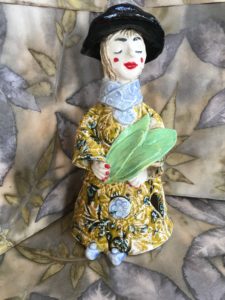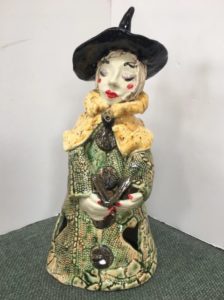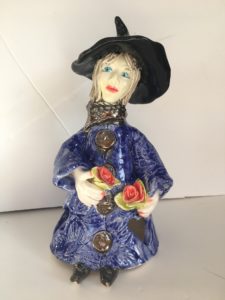Fishing with my father
Fishing with my father.
Each May, my father would take out the big red wooden box where he stored his fishing tackle. Everything was carefully checked, the reels, the flies stored in old boiled sweet tin’s carefully wound through slits in discs of cardboard. The fishing rods were taken out of their cloth covers and the reels were attached just to check that they were ready for action, then satisfied that everything was in order, Dad would replace all, together with his canvas fishing bag in the red box.
Since my brother went away to college Dad usually took off alone on his fishing trips to Connemara. My mother would make him a few sandwiches when she came in from early Mass while he chose which fishing gear he would take with him. Nothing was haphazard, everything was carefully chosen, the tackle, the rain gear, the boots, and he would set off in the Morris Minor and pick up his friend Scanlon on the way. I don’t know how Scanlon knew to expect him because we had no telephone but he always seemed to be ready when Dad called. And Dad would return in the evening, tanned, relaxed, happy and usually with a few trout in the bag. It was Mother’s job to gut and clean them.
Mother spent her days in useful pursuits- sewing, cooking and gardening were activities she excelled at. She was a big Church goer also. And I took after her, I was a great little one for “ Filling the unforgiving minute with sixty seconds worth of distance run.” A great one for “finding a job to do.”
I don’t know what inspired Dad to ask me to go fishing with him that day. “Can I go?” I asked my mother. I usually referred decisions to her. “ Of course! Have you wellingtons? Bring a coat. I’ll make another sandwich.” I was ready in no time and we set off in the car, picking up Scanlon on the way. I sat in the back with the fishing gear. Dad and Scanlon in front, Scanlon keeping up a flow of conversation, Dad silent. Out past Oughterard, still travelling at that steady 35 miles an hour over that silent landscape, the car bumping along over the dips and rises of the road. It was well past 11 when we parked the car in a hidden secluded boreen beyond Recess. I didn’t understand the need for such discretion then.
Shoes were exchanged for boots and wellies, Fishing bags were carried cross chest, and the fishing rods were carried in our right hands doing doubling duty as staffs and we set off over the bog to the lake. It was warm but overcast, Dad insisted I bring my rain coat in the bag. “The weather was ever changeable out here,” he said. Scanlon set off in front, Dad next and I brought up the rear. “Step where I step, don’t fall into the bog,” were the instructions and it wasn’t easy hopping from turf clump to turf clump. Eventually we arrived at the lake. Dad set me up, putting the hook on the fishing line and showing me how to cast. I wasn’t much good at that but I did my best, then leaving me with my sandwich and a bottle of milk he set off to the other side of he lake.
I soon got bored with casting that line on the water, so I just sat and watched the little ripples on the lake surface, the flies hovering just above its surface and occasionally a fish just breaking the surface to bite. The sun went in behind a carpet of fast racing clouds and I was glad of that rain coat for shelter. I wasn’t long about demolishing that sandwich and wishing I had a few more. There wasn’t another soul in sight, I had no idea where the others had got to. I wasn’t tempted to follow and find them though, too afraid I’d get lost or fall down a bog hole! There was something hypnotic about the almost silence. I heard no human voices, so birds singing, just the sound of the breeze on the bog and the slight lapping sound of the water against the stones at the side of the lake.
I wished I had brought a book.
Shortly after six , I reckon, I saw Dad coming back my way.
“Any luck?” He asked.
“No, I got a few bites though,” I replied, “A bit too bright today for them, maybe?” He answered, although I noticed he had a couple of brown trout.
“Scanlon has gone on to the next lake, he’ll be a while yet.” Dad sat down on a stone at the edge of the lake. The sun had gone in and the breeze on the lake had picked up.
“I often came here with my grandfather and Josie long ago.” He rarely talked about himself or his boyhood. His grandfather must have been dead at least thirty five years at that stage.
“We’d better be heading back to the car,” he said, “Scanlon will catch up,”and he set off the way we had come. First down into the little valley, and we came to the stream running through it, he reached out his fishing rod which I grasped to give myself a bit of stability as I stepped on the stones in the stream. We got onto the bank and started the ascent and when we got to the summit of that little rise, Dad stopped and we could see for miles around. Suddenly the sun came out from behind the clouds, and a slanted shaft of sunlight lit up the bog. He straightened up and I could see his gaze sweeping the landscape. I followed his gaze and I saw the little white balls of bog cotton bobbing in the breeze, the intense colours of the earth, the browns and the greens and the glisten of tiny pools of water every where. The grey sky had cleared and we were covered by a dome of delicate blue with high white fluffy clouds. The midgets were everywhere. The mountains were pale blue-grey and distant. I saw Dad’s eyes scanning the scene, his breathing was slow and regular. I watched him intensely at that moment keeping my eyes on his face. He seemed to see something I didn’t.
“ Such magnificence, its great to be alive,” was all he said.
And suddenly the air around us seemed to expand and become more spacious. It was a sacred moment, something I had never experienced before, and for the first time in my life I realized that there was more to life that “the unforgiving minute” and “sixty seconds worth of distance run.”
It was the first time I had ever seen anyone experience a sacred moment and be grateful for the gift of life.
It was a moment of grace. I’ve never forgotten it. We walked on.


